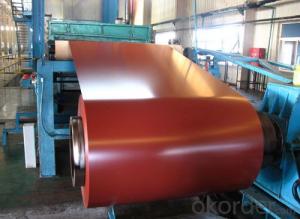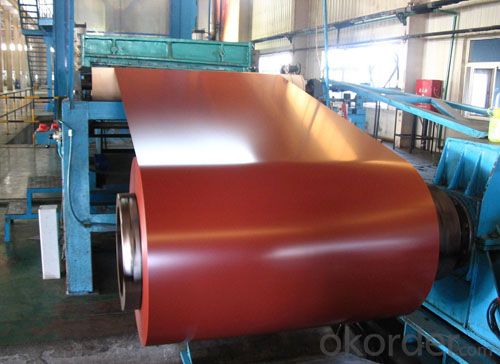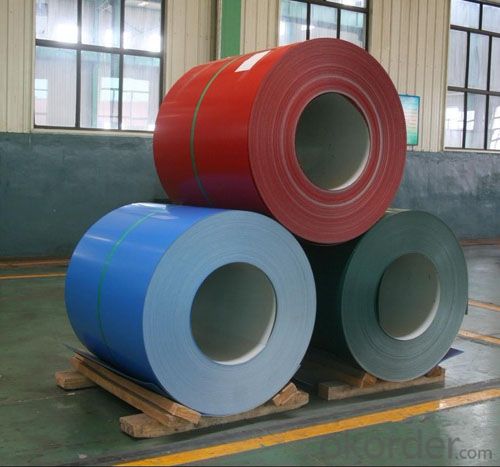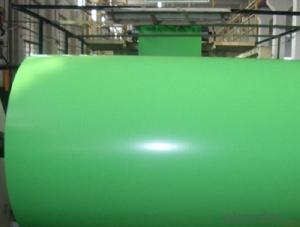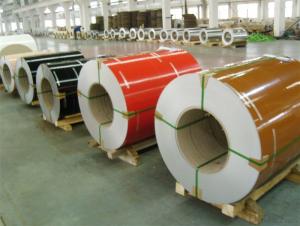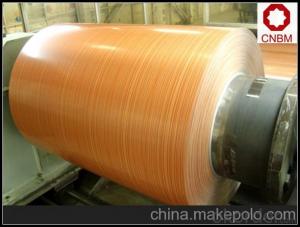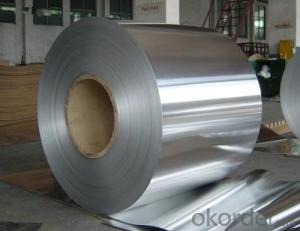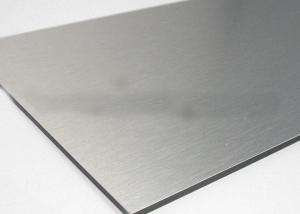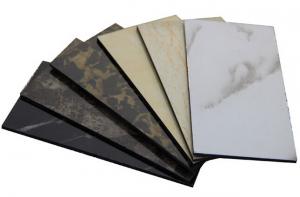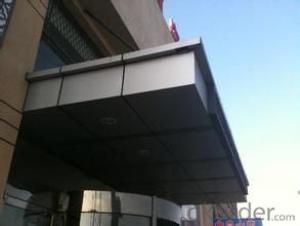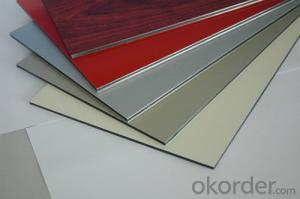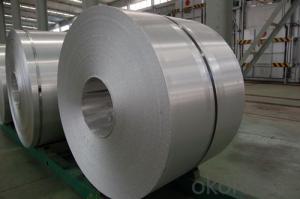Brushed Aluminum Coil Sheet for Composite Panel
- Loading Port:
- China main port
- Payment Terms:
- TT OR LC
- Min Order Qty:
- 3 m.t.
- Supply Capability:
- 5000 m.t./month
OKorder Service Pledge
OKorder Financial Service
You Might Also Like
Specification
1.Description of Painted Aluminium Coil Sheet for Composite Panel
Alloy: 1050, 1100, 3003, 3005, 3105, etc
Thickness: 0.15mm~1mm
Painting Thickness: 5-10mic for back coating, 15-40mic for top coating
Paint Types: PVDF, PE, HDPE, LDPE, etc
Width: 900mm- 1950mm
Color: According to RAL colors or customer's samples
2. Application of Painted Aluminium Coil Sheet for Composite Panel
(1).Interior: wall cladding, ceilings, bathrooms, kitchens and balconies, shutters, doors...
(2).Exterior: wall cladding, facades, roofing, canopies, tunnels,column covers , renovations...
(3).Advertisement: display platforms, signboards, fascia, shop fronts...
3. Feature of Painted Aluminium Coil Sheet for Composite Panel
*Such coil is specially designed to replace aluminum ingot, due to the high export tax of aluminum ingot, the coil has better price than ingot.
*This type of coil can fit customer's remelting furnace just like ingot, no need to make any change to the production line that was previously used for ingot. The standard coil size and weight is very suitable for the feed gate of furnace.
*This type of coil causes less material wastage than ingot when remelted.
*Our coil is made directly from ore, no need to go though the ingot making process, quality is much better than other suppliers who use ingot scrap to make coil.
Be free from Oil Stain, Dent, Inclusion, Scratches, Stain, Oxide Dicoloration, Breaks, Corrosion, Roll Marks, Dirt Streaks and other defect which will interfere with use
4. Certificate:
SGS and ROHS(if client request, paid by client), MTC(plant provided), Certificate of Origin(FORM A, FORM E, CO), Bureau Veritas and SGS (if client request, paid by client), CIQS certificate
5. Image of Painted Aluminium Coil Sheet for Composite Panel
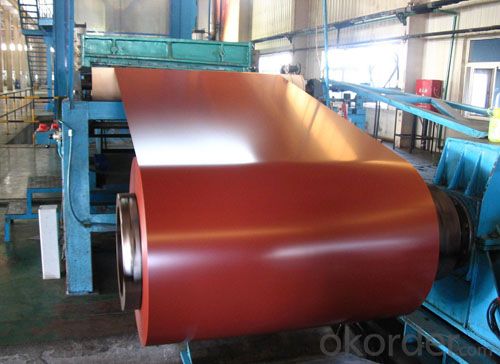
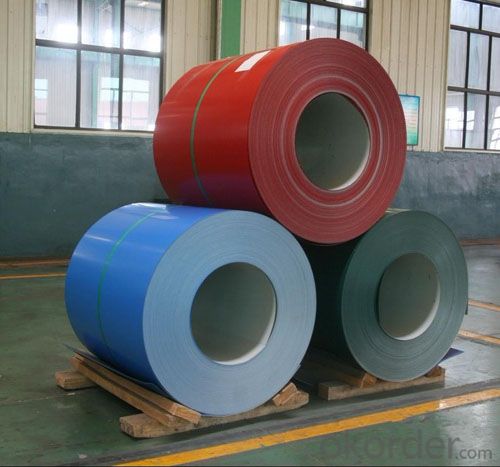
6. FAQ
1) What is your delivery time?
Our regular production time is over 30 days, It depends on the order quantity also.
2) What is your payment term?
We accept T/T, LC at sight, Usance LC 30, 60, 90, 120, 180 DAYS.
3) What is your price structure?
Our foil price is based on Shanghai Metal Price(SMM), not LME, but we could offer LME+ Conversion for your reference.
4) What is your Delivery term?
We do FOB, CFR, CIF, we don't do DDP.
5) Could you offer sample?
We could offer sample as your requirement. A4 Size sample is free for you, for bigger roll sample, it depends on the coil weight.
- Q: Is aluminum veneer the same as color coated aluminum coil?
- Not necessarily, but you may call it like this. Aluminum veneer is the panel processed by aluminum plant. It has different size and thickness according to customer’s requirements. Color coated aluminum coil has been coated through two processes of bake and roast, for example, the coil or sheet formed of the coating of cars.
- Q: What is the typical hardness of aluminum coils?
- The typical hardness of aluminum coils can vary depending on various factors such as the alloy composition, tempering process, and intended application. Generally, aluminum coils are manufactured in a range of hardness levels to cater to different needs and requirements. Aluminum coils can be produced in different tempers, including soft, half-hard, and full-hard. Soft aluminum coils have low hardness and are more malleable, making them suitable for applications that require easy formability such as packaging and wrapping materials. Half-hard aluminum coils are moderately hardened and offer a balance between formability and strength, making them suitable for applications like roofing and siding. Full-hard aluminum coils have the highest hardness and provide excellent strength, making them ideal for applications that require structural integrity such as automotive parts and construction materials. To determine the specific hardness of aluminum coils, various testing methods such as Rockwell hardness, Vickers hardness, or Brinell hardness can be employed. These tests measure the resistance of the aluminum surface to indentation and provide a numerical value that indicates the material's hardness. However, it is essential to consult the manufacturer or supplier for specific hardness values as it can vary depending on the specific alloy and temper of the aluminum coil.
- Q: Can aluminum coils be used for electrical conductors?
- Indeed, aluminum coils are capable of serving as electrical conductors. Aluminum, being a metal with exceptional conductivity, finds frequent utilization in electrical contexts. With electrical conductivity ranking second only to copper, aluminum proves to be a fitting material for the conduction of electricity. In numerous electrical apparatuses and setups like transformers, motors, generators, and power transmission lines, aluminum coils are commonly employed.
- Q: How are aluminum coils used in the production of furniture and fixtures?
- Aluminum coils are commonly used in the production of furniture and fixtures due to their lightweight and durable nature. They are mainly utilized for manufacturing furniture frames, legs, and other structural components. Additionally, these coils can be easily shaped and formed into various designs, allowing for versatility in furniture design. The use of aluminum coils also ensures resistance to corrosion, making the furniture suitable for indoor and outdoor settings.
- Q: Are aluminum coils resistant to mold and mildew?
- Generally, aluminum coils have resistance to mold and mildew. Unlike materials like wood or fabric, aluminum is non-porous and does not absorb moisture. This characteristic reduces its susceptibility to mold and mildew growth. Moreover, protective finishes are often applied to aluminum coils, enhancing their resistance to mold and mildew. Nevertheless, it is important to remember that although aluminum coils are less prone to mold and mildew, they are not entirely immune. If exposed to excessive moisture or humidity, mold and mildew can still develop. Thus, regular cleaning and maintenance are essential to prevent potential mold or mildew growth.
- Q: What are the potential applications of coil-coated aluminum coils?
- Coil-coated aluminum coils have a wide range of potential applications due to their versatility and durability. Some common applications include roofing and cladding for buildings, automotive parts, signage, electronics, and appliances. The coil coating process enhances the aluminum's resistance to corrosion, weathering, and fading, making it suitable for both indoor and outdoor uses. Additionally, the ability to apply various colors and finishes to the coils allows for customization and aesthetic appeal in different industries.
- Q: i have some questions about aluminum can recycling??:how much can you get from doing that??where can i take them in indianapolis, in???and what else could i recycle??its good for the earth and i need some money!! :) :D thanks!!! :)
- Aluminum is not biodegradable. Also making aluminum from ore requires a lot of energy. Recycling cans is easy and saves a whole lot of energy reducing green house gases. Recycling aluminum also reduces the mining required to dig up aluminum ore thereby saving the land and stopping pollution from mine run-off.
- Q: What are the potential applications of colored aluminum coils?
- The possible uses for colored aluminum coils are extensive and varied, spanning across a multitude of industries. In the realm of construction, these coils serve both practical and aesthetic functions. Whether utilized as roofing material, siding, or ornamental features on structures, they offer protection against the elements while simultaneously enhancing visual appeal. In the automotive industry, colored aluminum coils find application in the creation of car body panels. The material's vibrant hues and durability make it an appealing choice for crafting stylish and long-lasting exteriors for vehicles. Additionally, the electronics and electrical industries benefit from the use of colored aluminum coils. They serve as casings for electronic devices, such as smartphones, tablets, and laptops, lending a visually pleasing touch to these gadgets. Furthermore, due to aluminum's lightweight nature, it is well-suited for heat sinks and other cooling components in electronic devices. The packaging industry can also take advantage of colored aluminum coils to produce captivating packaging materials for various products. The vibrant colors and sleek appearance of aluminum can enhance the visual allure of consumer goods, attracting potential buyers. Moreover, the furniture industry can employ colored aluminum coils to fashion contemporary and stylish furniture pieces. Aluminum's versatility allows for the creation of unique designs and shapes, adding a modern touch to interior spaces. Lastly, the signage and advertising industry can benefit from colored aluminum coils. They can be utilized to create custom signage, billboards, and promotional displays with vivid and long-lasting colors, serving as effective marketing tools. In summary, colored aluminum coils have an array of potential applications in industries such as construction, automotive, electronics, packaging, furniture, signage, and advertising. Their durability, lightweight nature, and aesthetic appeal make them a versatile material for a wide range of purposes.
- Q: What are the different surface protection methods for aluminum coils?
- There are several surface protection methods for aluminum coils, including anodizing, painting, powder coating, and laminating. Anodizing involves creating a protective oxide layer on the surface of the coil, which enhances its resistance to corrosion and wear. Painting involves applying a protective coating of paint, which not only adds an aesthetic appeal but also provides a barrier against environmental elements. Powder coating is a process in which a dry powder is applied electrostatically and then cured under heat, creating a durable and decorative surface finish. Lastly, laminating involves applying a protective film or sheet onto the surface of the coil, providing an additional layer of protection against scratches and abrasions.
- Q: What are the common coil inner diameters for aluminum coils?
- The common coil inner diameters for aluminum coils can vary depending on the specific application and industry requirements. However, some commonly used inner diameters for aluminum coils are 150 mm (5.9 inches), 200 mm (7.9 inches), and 300 mm (11.8 inches). These inner diameters are often chosen based on factors such as the coil's size, weight, ease of handling, and compatibility with manufacturing equipment. It is important to note that these are just a few examples, and the actual inner diameters may vary depending on the specific needs of each industry or application.
Send your message to us
Brushed Aluminum Coil Sheet for Composite Panel
- Loading Port:
- China main port
- Payment Terms:
- TT OR LC
- Min Order Qty:
- 3 m.t.
- Supply Capability:
- 5000 m.t./month
OKorder Service Pledge
OKorder Financial Service
Similar products
Hot products
Hot Searches
Related keywords
